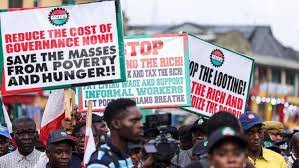Nigeria at a Crossroads: Addressing the issues and Charting a Path to a Better Future
Nigeria as a nation is currently experiencing an incredibly challenging period of turbulence. It is really disheartening to witness the state of affairs in our beloved country.
 source
source
People are enduring immense hardship, and there is a saying that I believe resonates deeply with the current situation: "A hungry man is an angry man." When citizens are faced with hunger and famine, it raises a critical question: what will become of our nation if its people perish from these conditions? Parents are struggling to provide for their children, and even those fortunate enough to have jobs find it difficult to afford three square meals a day. The situation seems to deteriorate with each day passing by.
 source
source
In such dire circumstances, it is not surprising that some people might resort to crime as a means of survival. There is no gain in saying that when the situation becomes radically unbearable, desperate measures often follow.
Since the emergence of our current president, many people have observed that life has become increasingly difficult. The removal of the fuel subsidy and the subsequent floating of the naira are perceived as major catalysts for this turbulence and social unrest. Under the previous administration, people voiced their complaints and frustrations, but little did they know that even more severe hardships were on the horizon.
The removal of the fuel subsidy, in particular, has had a profound impact on the cost of living. Fuel prices have skyrocketed, leading to increased transportation costs, which in turn affect the prices of goods and services. This has created a ripple effect throughout the economy, making it harder for the average Nigerian to afford basic necessities. The floating of the naira has further compounded these issues by causing inflation to surge, eroding the purchasing power of the naira and making life even more unaffordable for many.
In light of these challenges, many are left wondering who can save us from this calamity. Will divine intervention be the only solution, or is there something we, as citizens, can do to change the course of our nation's destiny? It is often said that our destiny lies in our hands, but the persistent problem of bad leadership seems to undermine any efforts for positive change.
I believe that addressing these deeply rooted issues requires more than just hope or prayer; it demands concrete actions and systemic changes.
While I'm of the opinion that protest is a legitimate form of expressing dissatisfaction and demanding change. However, it is crucial to consider its potential outcomes. There is a planned protest set for the first of August, but will it truly solve our problems? We must also remember the tragic events of the End SARS protest in Lagos, where many lives were lost, and ask ourselves if we are prepared for a similar outcome.
The question of when Nigeria will be free from the grip of bad leaders is a complex one. It involves understanding the systemic issues that perpetuate corruption and poor governance. It also requires a collective effort to hold leaders accountable, demand transparency, and push for reforms that promote good governance and social justice.
In addition to protests, there are other avenues through which change can be pursued. Civic engagement, voter education, and active participation in the political process are essential. Educating the populace about their rights and responsibilities, as well as the importance of voting for credible candidates, I believe can lead to a more informed and empowered electorate. This, in turn, can drive the election of leaders who genuinely care about the welfare of the people and are committed to addressing the country's challenges.
Also, strengthening institutions and ensuring the rule of law are critical steps towards achieving lasting change. Independent and transparent institutions can help curb corruption and promote accountability. Ensuring that laws are applied equally to all citizens, regardless of their status or position, can foster a sense of justice and fairness.
While I believe the road to a better Nigeria may seem long and arduous, it is not an impossible journey. It requires collective effort, perseverance, and a commitment to building a nation where every citizen can thrive. By working together and holding our leaders accountable, we can create a brighter future for ourselves and future generations.
The current situation in Nigeria is indeed dire, but it is not beyond redemption. Even though protests can raise awareness and catalyze change, they must be part of a broader strategy that includes civic engagement, voter education, and institutional reforms. Our destiny is in our hands, and I believe by taking concrete steps towards positive change, we can overcome the challenges we face and build a better Nigeria for all.
Sending Love and Ecency Vote!

Nigeria at this point will not be saved by “civil” actions. Even now, Nigerians are already divided (some for and some against). I believe that there’s no gentle approach to this situation anymore. Unless people will continue to starve and die, businesses close down, only the violent can take it by force.
The same Nigerians (governmental system) robs and sucks its citizens. It’s only normal that we’ve endured for almost 12 years and want change.
Well, in as much I might want to agree with you. Protest in this country has always been hijacked and thieves, which invariably causes mayham and loss of property.
True that. And I will not blame them but the system that “thieves” have already created in this country. Because it’s true. The greatest thieves in Nigeria, sit in places of power
I can't agree more with you.